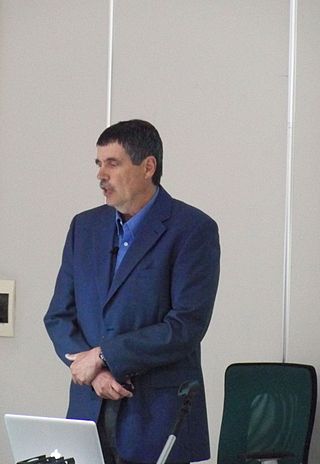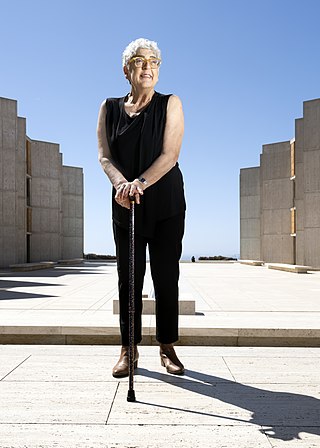Related Research Articles
Elliot Meyerowitz is an American biologist.
Simon Asher Levin is an American ecologist and the James S. McDonnell Distinguished University Professor in Ecology and Evolutionary Biology and the director of the Center for BioComplexity at Princeton University. He specializes in using mathematical modeling and empirical studies in the understanding of macroscopic patterns of ecosystems and biological diversities.
Russell Scott Lande is an American evolutionary biologist and ecologist, and an International Chair Professor at Centre for Biodiversity Dynamics at the Norwegian University of Science and Technology (NTNU). He is a fellow of the Royal Society and a member of the United States National Academy of Sciences.

John Roger Speakman is a British biologist working at the University of Aberdeen, Institute of Biological and Environmental Sciences, for which he was Director from 2007 to 2011. He leads the University's Energetics Research Group, which is one of the world's leading groups using doubly labeled water (DLW) to investigate energy expenditure and balance in animals. Between 2011-2020, he was a '1000 talents' Professor at the Institute of Genetics and Developmental Biology, Chinese Academy of Sciences, in Beijing, China, where he ran the molecular energetics group. In 2020 he moved to the Shenzhen Institutes of Advanced Technology, Chinese Academy of Sciences in Shenzhen, China where he works at the Center for Energy Metabolism and Reproduction and Head of the Shenzhen Key laboratory of Metabolic Health.

John Charles Avise is an American evolutionary geneticist, conservationist, natural historian, and prolific science author. He is an Emeritus Distinguished Professor of Ecology & Evolution, University of California, Irvine, and was previously a Distinguished Professor of Genetics at the University of Georgia.

Denis Duboule is a Swiss-French biologist. He earned his PhD in Biology in 1984 and is currently Professor of Developmental Genetics and Genomics at the École polytechnique fédérale de Lausanne (EPFL) and at the Department of Genetics and Evolution of the University of Geneva. Since 2001, he is the Director of the Swiss National Research Center "Frontiers in Genetics" and since 2017, he is also a professor at the Collège de France. He has notably worked on Hox genes, a group of genes involved in the formation of the body plan and of the limbs.
Alan Matthew Hastings is a mathematical ecologist and distinguished professor in the Department of Environmental Science and Policy at the University of California, Davis. In 2005 he became a fellow of the American Academy of Arts and Sciences and in 2006 he won the Robert H. MacArthur Award.
Stephen Joseph Elledge is an American geneticist. He is the current Gregor Mendel Professor of Genetics and of Medicine at the Department of Genetics of Harvard Medical School and in the Division of Genetics of the Brigham and Women's Hospital. His research is focused on the genetic and molecular mechanisms of eukaryotic response to DNA damage and is known as the discoverer of the DNA damage response (DDR).

Kamaljit Singh Bawa, FRS is an evolutionary ecologist, conservation biologist and a distinguished professor of Biology at the University of Massachusetts, Boston. He is also the founder of Ashoka Trust for Research in Ecology and Environment (ATREE). In 2012, Bawa received the first Gunnerus Sustainability Award, the world's major international award for work on sustainability. He is an elected member of the American Academy of Arts and Sciences. He was elected a Member of the American Philosophical Society in 2019.
Marcus William Feldman is the Burnet C. and Mildred Finley Wohlford Professor of Biological Sciences, director of the Morrison Institute for Population and Resource Studies, and co-director of the Center for Computational, Evolutionary and Human Genomics (CEHG) at Stanford University. He is an Australian-born mathematician turned American theoretical biologist, best known for his mathematical evolutionary theory and computational studies in evolutionary biology, and for originating with L. L. Cavalli-Sforza the theory of cultural evolution.

Lynne Elizabeth Maquat is an American biochemist and molecular biologist whose research focuses on the cellular mechanisms of human disease. She is an elected member of the American Academy of Arts and Sciences, the National Academy of Sciences and the National Academy of Medicine. She currently holds the J. Lowell Orbison Endowed Chair and is a professor of biochemistry and biophysics, pediatrics and of oncology at the University of Rochester Medical Center. Professor Maquat is also Founding Director of the Center for RNA Biology and Founding Chair of Graduate Women in Science at the University of Rochester.

Joanne Chory is an American plant biologist and geneticist. Chory is a professor and director of the Plant Molecular and Cellular Biology Laboratory, at the Salk Institute for Biological Studies and an investigator of the Howard Hughes Medical Institute.

Don W. Cleveland is an American cancer biologist and neurobiologist.
Narayana Balakrishnan Nair (1927–2010) was a marine biologist, ecologist and the founder president of Kerala Science Congress. He was known for his advocacy of trawling ban during monsoon seasons which was later accepted and imposed by the Government of Kerala. A Jawaharlal Nehru fellow, Nair was an elected fellow of all the major Indian science academies as well as the Zoological Society of London. The Council of Scientific and Industrial Research, the apex agency of the Government of India for scientific research, awarded him the Shanti Swarup Bhatnagar Prize for Science and Technology, one of the highest Indian science awards, in 1971, for his contributions to biological sciences. He received the fourth highest Indian civilian honor of the Padma Shri in 1984.

Amitabh Joshi is an Indian evolutionary biologist, population ecologist, geneticist and a professor at Jawaharlal Nehru Centre for Advanced Scientific Research (JNCASR). He heads the Evolutionary Biology Laboratory at JNCASR and is known for his studies on Evolutionary genetics and Population ecology. An elected fellow of the Indian Academy of Sciences, National Academy of Sciences, India, and Indian National Science Academy, he was also a J. C. Bose National Fellow (2011-2021) of the Department of Science and Technology. He served as the Chief Editor of the Journal of Genetics (2008-2014) and Editor of Publications of the Indian Academy of Sciences (2017-2021). The Council of Scientific and Industrial Research, the apex agency of the Government of India for scientific research, awarded him the Shanti Swarup Bhatnagar Prize for Science and Technology, one of the highest Indian science awards, in 2009, for his contributions to biological sciences.
Sue Biggins is an American cell biologist who studies kinetochores and the transfer of chromosomes during cell division. Her team isolated kinetochores from cells, enabling them to be studied separately under laboratory conditions. They also discovered that tension helps kinetochores to attach to microtubules and move from the mother cell to the daughter cells when cells divide. The methodology and concepts she developed for yeast kinetochores are being adopted in laboratories around the world. Biggins was elected to the American Academy of Arts & Sciences (AAAS) in 2018.

Andrew G. Clark is an American population geneticist. He is currently Jacob Gould Schurman Professor of Population Genetics in the Department of Molecular Biology and Genetics and a Nancy and Peter Meinig Family Investigator at Cornell University. He is the current head of the Graduate Computation Biology field. He is also co-director of Cornell's Center for Comparative and Population Genomics and a member of a working group for the National Human Genome Research Institute.
Kelly Zamudio is the Doherty Chair in Molecular Biology in the Department of Integrative Biology at the University of Texas Austin. She was formerly the Goldwin Smith Professor of Ecology and Evolutionary Biology at Cornell University and Curator of Herpetology at the Cornell Museum of Vertebrates.
Victoria Louise Sork is an American scientist who is Professor and Dean of Life Sciences at University of California, Los Angeles. She studies tree populations in California and the Eastern United States using genomics, evolutionary biology and conservation biology. Sork is a Fellow of the American Association for the Advancement of Science.

Neil John Gemmell, is a New Zealand geneticist. His research areas cover evolutionary genetics and genomics, molecular ecology, and conservation biology. Originally from Lower Hutt, he obtained his PhD at La Trobe University in Melbourne, Australia. Since 2008, Gemmell has been a professor at the University of Otago and since 2019 holds one of their seven Sesquicentennial Distinguished Chairs. Significant work includes the search of the Loch Ness Monster (2018) and the sequencing of the tuatara genome. In 2020, Gemmell received the Hutton Medal by the Royal Society Te Apārangi.
References
- 1 2 3 4 5 6 7 "Fred W. Allendorf CV" (PDF). Retrieved June 7, 2018.
- 1 2 "Google Scholar Citations".
- ↑ "Fred W. Allendorf". American Academy of Arts & Sciences. Retrieved June 15, 2020.
- ↑ Schwartz, Michael K. (2016). "Recipient of the 2015 Molecular Ecology Prize: Fred Allendorf". Molecular Ecology. 25 (2): 450–453. Bibcode:2016MolEc..25..450S. doi:10.1111/mec.13503. PMID 26800037.
- ↑ "A year later, Fred Allendorf struggles to heal from deadly Mount Jumbo avalanche | State and Regional". Helenair.com. February 28, 2015. Retrieved March 4, 2017.